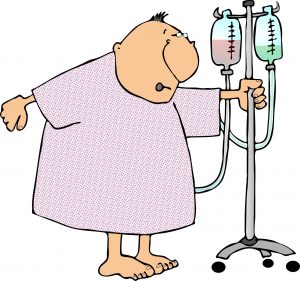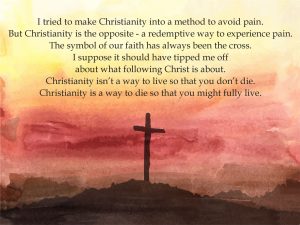don’t kick the dog
Have you ever heard the story about the man who went to work, got yelled at by his boss and accused of something he didn’t do, made a mistake that lost him an important account, took a phone call from his wife who told him the dishwasher was broken and would cost a thousand dollars to replace, and spent an hour in traffic that was backed up for no apparent reason? Do you know what this man did once he got home? He kicked the dog.
That’s right, poor Bowser got it right in the ribs because his owner had a terrible, terrible day!
You may not be a dog-kicker, but I’ll bet you have some common objects or people who experience the release of your stress at the end of a rough day. This is called “displacement” in the field of psychology. Displacement is the expression of our negative feelings to a less-threatening person or thing.

How often have I, as the father of four children, snapped at one (or all!) of my children for just being a silly kid because I have an internal mess I am dealing with? I have often not taken care of my child’s heart, in large part because I have not taken care of mine. Or, better said, I have not let my heart be taken care of.
What can be done? Being an adult, being a parent, being a spouse is HARD! Nurturing children well during this struggle is impossible, especially when we only rely on our own strength. You might say, “I need to lean more on the Lord and His strength.” As a fellow believer, I would say “Yes, of course!” As a therapist, I would then say, “What does it mean to lean on the Lord?”
I heard it said recently that emotions physiologically prepare our bodies for action. But if our bodies do not take the action suggested by the emotion, it gets stored in our body as stress. What did the dog-kicking man feel when he was accused of something he did not do? Likely anger. What did he feel when he made a mistake? Likely regret and shame. What did he feel when sitting in traffic? Likely helplessness and frustration. Conscious awareness of these feelings would have helped him consider more appropriate actions. He could’ve confronted his boss. He could’ve made a phone call to the account he lost, owning his mistake and taking steps to remedy the situation. These actions would surely have helped relieve some of the stress and may have made his dog-kick a little softer.
Often, however, we do not have an opportunity to take tangible steps to remedy a stress-inducing problem (see the traffic example above!). We find ourselves powerless. In these moments it can be helpful to simply name what we are feeling. In my work as a therapist, I’ve found that it truly does bring some relief to clients to just name what they are experiencing and express it. This is even MORE effective at lowering stress when we can name it with another person, especially when that person is able to empathize with you and join you in the hardship. If you are forced to live in a dungeon, it is awfully nice to have a friend with you in the dungeon!
But sometimes we can’t always phone a friend. This is where the real, actual, living Heavenly Father meets us in our real, actual, living struggle. Psalm 46 tells us, “God is our refuge and strength, a very present help in trouble.” Do we believe that? Do we know that he is very present with us, especially when we are struggling? What did Peter mean when he wrote, “Humble yourselves, therefore, under the mighty hand of God so that at the proper time he may exalt you, casting all your anxieties on him, because he cares for you” (1 Peter 5:6-7)? It requires a measure of humility to say to the living God, “This is too much for me to handle, I am overwhelmed, anxious, and angry, please help me.” Once again, if we are able to actually name what we are feeling to another person, it will help us with our internal stress. Our Heavenly Father delights to hear from us, like any good father would his children!
May we all learn to cast our burdens on people who are safe and welcoming, as well as on our loving Heavenly Father. I don’t want to ever again harm my children, my spouse, or even my poor dog because I have kept all my stress to myself. And when I inevitably neglect to share my burdens and hurt someone I love, I hope I cast that burden on the Lord, as well.
 Ben Jones is the director of the Barnabas Center – Triad and is a Licensed Clinical Mental Health Counselor. His wife Amy, an amazing woman, stays home with their four children. Ben can be reached at bjones@thebarnabascenter.org.
Ben Jones is the director of the Barnabas Center – Triad and is a Licensed Clinical Mental Health Counselor. His wife Amy, an amazing woman, stays home with their four children. Ben can be reached at bjones@thebarnabascenter.org.







